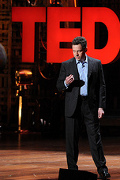









In the last podcast episode on Plantinga and properly basic beliefs, I briefly discussed the “Great Pumpkin Objection.” As it’s a subject worthy of a blog post of its own, and given that I know some people prefer things in writing, I thought I’d add a blog entry focused on that objection.
Alvin Plantinga has hammered out and defended the notion that if God (the Christian God that he believes in) really exists, then a Christian’s belief in God can be construed as properly basic. A properly basic belief is one that is rationally held and yet not derived from other beliefs that one holds (this is another way of saying that it is not justified by what is often called evidence). We hold many such beliefs, for example, the belief that the universe was not created just five minutes ago, any beliefs based on memory, belief that other minds exist, the belief that we are experiencing a certain colour, and so on. Set aside, for now, the fact that a lot of Christians think that they can produce decent evidence for the existence of God. Plantinga argued – successfully in my view – that even if that’s true, theism can be construed as properly basic and hence suitably justified even without such evidence. God created us in such a way that when we function properly we believe in him. The normal epistemic response to creation is to believe things like “God created this,” or more fundamentally, “God is real.” For more details, check out the podcast episode.
One bandwagon that anti-theists have jumped on is to claim that if theists can claim that their belief in God is basic, then just anybody at all can do this in regard to their belief in just anything. Here’s one popular version of that objection: In the comic strip Peanuts, the character Linus believes that there exists a Great Pumpkin who rises from the pumpkin patch every Halloween and rewards good children with presents. If Christians get to think that belief in God can be properly basic, then why couldn’t a person (like Linus) think that belief in the Great Pumpkin is properly basic, and so claim the right to believe it even though he cannot produce evidence for the belief’s truth?
Read More
 NOTE: In this episode I call it episode 40. It’s not. It’s episode 39.
NOTE: In this episode I call it episode 40. It’s not. It’s episode 39.






 It’s back!
It’s back!